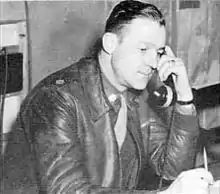Addison Baker
Lieutenant Colonel Addison Earl Baker (January 1, 1907 – August 1, 1943) was commander of the 93rd Bombardment Group (Heavy) in the U.S. Army Air Forces who led the group on the low-altitude Allied bombing mission of oil refineries at Ploieşti, Romania, Operation Tidal Wave. For his actions during World War II he received the United States of America's highest military decoration, the Medal of Honor (posthumously).[1]
Addison Baker | |
|---|---|
 Addison Baker | |
| Born | January 1, 1907 Chicago, Illinois |
| Died | August 1, 1943 (aged 36) Ploiești, Romania |
| Buried | remains never recovered; memorial in Florence American Cemetery and Memorial, Florence, Italy |
| Allegiance | |
| Service/ | |
| Years of service | 1929–1943 |
| Rank | |
| Commands held | |
| Battles/wars | World War II |
| Awards | |

Baker joined the Army Air Corps from Akron, Ohio in 1929, and earned his wings and a commission in 1931.[2]
Final mission
On August 1, 1943, the 93d Bomb Group, one of three from the Eighth Air Force sent to the Ninth Air Force especially for this mission, took to the air at Benghazi, Libya. Piloting Hell's Wench, a B-24 Liberator (Serial 42-40994), Baker led the 93rd as the second formation in the five-group mission of 177 aircraft. Co-piloting the aircraft was a volunteer and former member of the 93d, Major John L. Jerstad.
En route the aircraft carrying the mission navigator crashed at sea. As a result, when the force reached the target area, the lead group turned at the wrong point and flew towards Bucharest. Baker attempted to warn the mission commander of this error, but when that failed, led the remainder of the force to the correct turning point.
Although Hell's Wench was in flames and had been seriously damaged by German anti-aircraft guns, Baker maintained formation and bombed his target. Subsequently, Baker broke formation to avoid a mid-air collision with bombers from the lead group, now arriving in the target area from the opposite direction. He attempted to gain altitude so that his crew could escape by parachute, but despite his efforts, Hell's Wench crashed and exploded, killing Baker and the other nine airmen aboard.
Although his body was never recovered he was given a memorial site in Florence American Cemetery and Memorial, Florence, Italy.[3]
Honors
On March 11, 1944, Baker was posthumously awarded the Medal of Honor. Major Jerstad also received the Medal of Honor, on October 28, 1943, for his role on the mission.
| Army Air Forces Pilot Badge |
| Medal of Honor | |
| Silver Star | |
| Distinguished Flying Cross | |
| Purple Heart | |
| Air Medal with two bronze oak leaf clusters | |
| Presidential Unit Citation with bronze oak leaf cluster | |
| American Defense Service Medal | |
| American Campaign Medal | |
| European-African-Middle Eastern Campaign Medal with silver campaign star | |
| World War II Victory Medal |
Medal of Honor citation
Rank and organization: Lieutenant Colonel, U.S. Army Air Corps, 93d Heavy Bombardment Group. Place and date: Ploesti Raid, Rumania, August 1, 1943. Entered service at: Akron, Ohio. Born: January 1, 1907, Chicago, Ill. G.O. No.: 20, March 11, 1944.
For conspicuous gallantry and intrepidity above and beyond the call of duty in action with the enemy on August 1, 1943. On this date he led his command, the 93d Heavy Bombardment Group, on a daring low-level attack against enemy oil refineries and installations at Ploesti, Rumania. Approaching the target, his aircraft was hit by a large caliber antiaircraft shell, seriously damaged and set on fire. Ignoring the fact he was flying over terrain suitable for safe landing, he refused to jeopardize the mission by breaking up the lead formation and continued unswervingly to lead his group to the target upon which he dropped his bombs with devastating effect. Only then did he leave formation, but his valiant attempts to gain sufficient altitude for the crew to escape by parachute were unavailing and his aircraft crashed in flames after his successful efforts to avoid other planes in formation. By extraordinary flying skill, gallant leadership and intrepidity, Lt. Col. Baker rendered outstanding, distinguished, and valorous service to our Nation.[4]
References
- "Baker -- Lt Col Addison Earl Baker". Air Force Historical Support Division. Retrieved 2020-05-23.
- "Wings of Valor II- The Ploesti Raid". homeofheroes.com. Archived from the original on August 9, 2011. Retrieved March 8, 2016.
- American Air Museum
- "World War II (A–F), Baker, Addison entry". Medal of Honor recipients. United States Army Center of Military History. May 11, 2010. Archived from the original on 23 July 2010. Retrieved July 13, 2010.
External links
- "Addison Baker". Hall of Valor. Military Times. Retrieved July 13, 2010.